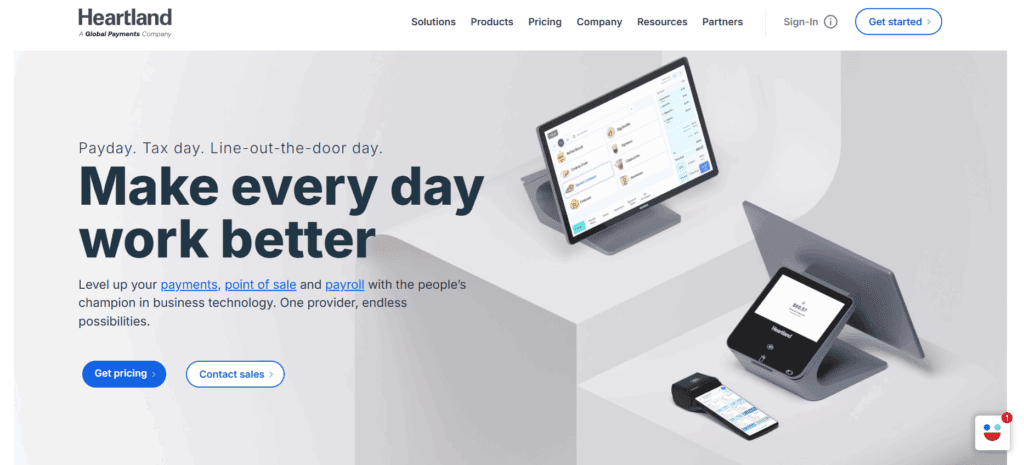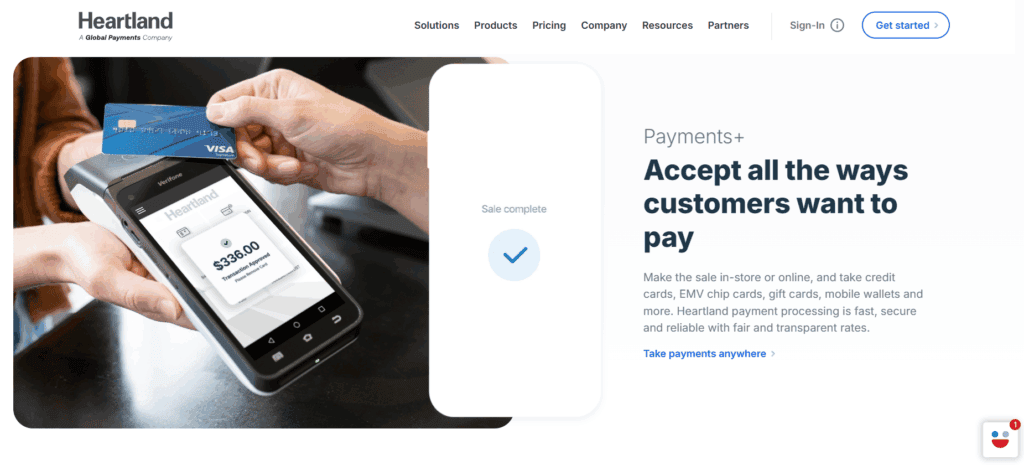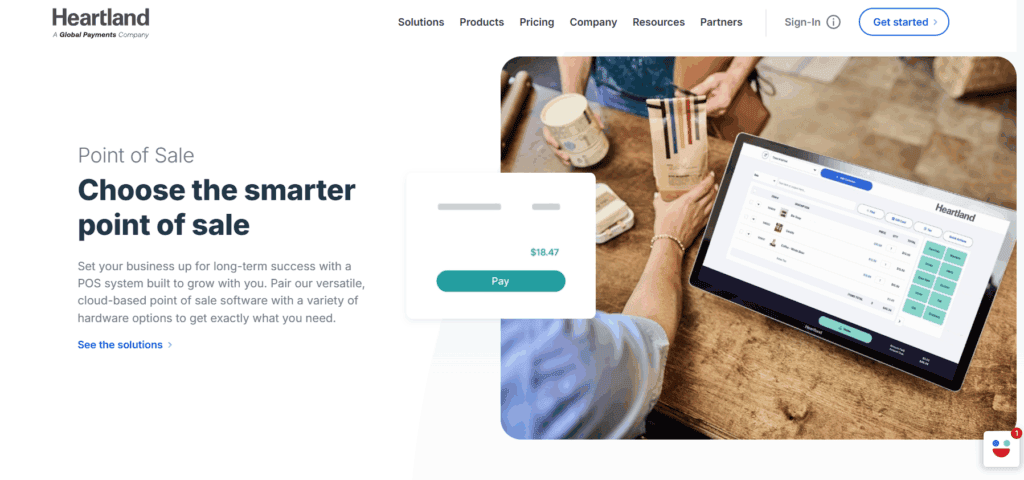Heartland Payment Systems Review

Heartland Payment Systems is a U.S.-based provider of merchant services that focuses on supporting small and medium-sized businesses. Founded in 1997 and acquired by Global Payments in 2016, Heartland continues to operate under its own brand name. Over the years, it has built a strong presence among traditional business types such as restaurants, retailers, and local service providers. Its longevity in the payments space gives it a reputation for reliability and domain expertise. Lets read more about Heartland Payment Systems Review.
Heartland provides a wide range of services, such as marketing tools, payroll management, POS systems, and credit card processing. Business owners who want to use a single provider to streamline their financial operations will find this bundled offering appealing. Although the company has traditionally prioritised physical operations, its digital services for mobile payments and e-commerce have been growing steadily.
One of Heartland’s key brand values is transparency in pricing and business practices. However, customer feedback reveals a range of experiences regarding fees and contracts. While many businesses value the convenience and breadth of services, some have raised concerns over unclear costs and contract terms. Despite these mixed reviews, Heartland continues to be a preferred provider for businesses seeking a well-rounded platform. Its investments in industry-specific tools and its effort to deliver personalized service help maintain its relevance in a highly competitive market.
Core Payment Processing Services | Heartland Payment Systems Review
Heartland’s main strength lies in its payment processing platform, which supports a wide range of payment types. This includes all major credit and debit cards, contactless payments, and digital wallets like Apple Pay and Google Pay. This versatility helps merchants accommodate diverse customer preferences at checkout.
The company places strong emphasis on transaction security. Its systems are EMV-compliant and support end-to-end encryption and tokenization, providing an added layer of protection for cardholder data. For merchants, this also means easier compliance with PCI DSS standards, as Heartland provides tools and support for certification.
Heartland also offers real-time transaction reporting. Business owners can access payment data through an online portal or mobile dashboard, allowing them to monitor sales performance in real time. Features like recurring billing and stored card details are also available, making the service suitable for subscription-based models.
Mobile businesses can use Heartland’s portable card readers, which connect to smartphones or tablets. This supports flexibility beyond a fixed retail setting. However, pricing for payment processing varies depending on business type, volume, and contract terms. Some users have reported unclear fee structures or unexpected charges, making it essential to review agreements carefully.
POS Solutions
Heartland’s POS systems are built to serve specific industries, with distinct configurations for restaurants, retail shops, and service providers. This tailored approach ensures that users have access to tools that match their operational workflows.
Restaurant POS setups may include features like table mapping, kitchen order routing, tipping support, and integrations for online food orders. Retail solutions typically include inventory tracking, barcode scanning, employee controls, and multi-store management. These capabilities help businesses optimize daily transactions and reduce manual errors.
Cash drawers, EMV-ready card readers, touchscreen terminals, and receipt printers are among the hardware products that Heartland sells. Since these devices are cloud-connected, remote management access and real-time syncing across locations are made possible.
With its simple interfaces and low training requirements, the POS software is made to be easy to use. Business owners can monitor performance metrics like sales volume, employee productivity, and stock levels with the aid of built-in analytics. However, users have pointed out that response times for hardware problems can differ and that installation might require technical support.
Upfront costs for hardware and recurring software fees should also be clearly understood, as some users report discovering additional charges post-signup.
E-Commerce and Online Payment Capabilities
Heartland has gradually strengthened its offerings for online transactions, though it remains more tailored to businesses that started with in-person sales. The platform now includes features like virtual terminals, hosted checkout pages, and recurring billing capabilities. A virtual terminal enables merchants to manually input card details, which is helpful for phone orders or invoice payments. Hosted payment pages allow non-technical users to create branded checkout experiences quickly and securely.
Heartland’s API infrastructure supports integration with popular e-commerce platforms like WooCommerce, Shopify, and BigCommerce. This flexibility lets businesses retain their existing website design while using Heartland’s payment gateway for secure processing.
Recurring billing and tokenized card storage support subscription-based revenue models. These tools are especially useful for service providers and membership businesses.
However, Heartland does not offer the full suite of e-commerce features found in platforms built specifically for digital retail. There are no built-in cart systems or advanced marketing automations. As a result, the platform is better suited to hybrid businesses expanding online rather than digital-first retailers.
Payroll and HR Services
Heartland’s payroll and human resources services aim to simplify internal operations for growing businesses. These tools cover direct deposit, automated tax filings, year-end documentation, and more. Employers can run payroll from anywhere using cloud-based software and offer employee self-service portals for pay and benefits access.
Time tracking, onboarding new hires, and regulatory compliance tools are among the HR management features offered by the platform. Integrated modules allow businesses to create handbooks, manage benefits, and keep policy records. One of the main advantages is the integration of time tracking, payroll, and POS systems. For instance, payroll can receive data straight from the POS platform, which minimises administrative effort and manual data entry.
However, these services may come at an additional cost and are not automatically bundled with core payment tools. Some users also feel that the interface is dated compared to modern HR tech platforms, although the functionality is largely robust for small to mid-sized businesses.
Customer Engagement and Loyalty Programs
To support customer retention, Heartland offers several tools aimed at improving engagement. These include digital gift card programs, loyalty schemes, and integrated email marketing. Gift cards can be sold both in-store and online and include balance tracking and reload features. They serve as a reliable source of upfront revenue while helping customers share brand value with others.
Loyalty programs can be customized using points, visits, or spend thresholds. These rewards can be easily integrated into the POS system, enabling automated redemption at checkout. Basic email marketing features are also available, allowing businesses to send targeted campaigns based on purchase history. Performance metrics like open rates and redemptions are tracked through the platform.
While these tools are valuable, they may lack the depth and sophistication of standalone CRM platforms. Businesses with advanced marketing strategies may still require external integrations for deeper customer segmentation or campaign automation.
Industry-Specific Solutions
Heartland has developed a suite of tools customized for sectors like restaurants, healthcare, education, salons, and fitness centers. These industry-focused features are built to resolve common pain points faced by operators in each field. For example, restaurants benefit from options like tableside ordering and kitchen display systems. Educational institutions get school payment portals and campus card management. Healthcare practices receive HIPAA-compliant payment solutions and recurring billing tools for treatment plans.
Appointment-driven models are supported in the personal services industry by tools for scheduling, customer profiling, and membership billing. For companies with particular operational requirements, these specialised tools help in establishing a more efficient workflow. Businesses might, however, become dependent on Heartland’s ecosystem, which would make it more difficult to connect third-party tools or switch providers. For people who value simplicity over modular flexibility, this trade-off might be acceptable.
Pricing and Contract Clarity
Heartland markets itself as a provider of “fair and honest” pricing, typically offering interchange-plus pricing models. This format is usually more transparent than flat-rate systems, but additional costs such as monthly service fees, PCI compliance charges, and statement fees can add up. Some merchants appreciate the detailed quotes and predictability of their fees, while others report discrepancies between quoted rates and actual charges. Concerns also surface around contract renewals, cancellation policies, and early termination fees.
To avoid surprises, it’s recommended that businesses request an itemized cost breakdown upfront. Understanding what is included and what may incur extra charges over time is crucial for long-term budgeting. Heartland’s pricing tends to benefit businesses with consistent processing volumes, while those with seasonal or low-volume operations may find more flexibility with alternative providers.
Security, Compliance, and Data Protection
The Heartland has prioritised security. Tokenisation, advanced encryption, and EMV-compliant technologies are all used by the platform to secure transactions at every stage. This is included in Heartland Secure, a proprietary security suite that offers coverage for breach warranties. Tools for PCI DSS compliance, such as risk analyses and continuous security scans, are also available to merchants. For companies that are not familiar with the technical requirements of card data protection, these services are extremely helpful.
For healthcare providers, Heartland offers HIPAA-compliant solutions that help maintain patient data privacy and meet federal regulations. These layers of compliance and protection are essential in today’s cyber-threat landscape. While the tools are comprehensive, users still need to ensure good internal security practices, as human error remains a key risk factor in data breaches.
Customer Support and User Experience
Heartland provides 24/7 phone support through U.S.-based representatives. Additional resources, such as setup guides, training materials, and online account management tools, are available through its website. Customer feedback on support is mixed. Some report responsive and effective service, while others describe delays and difficulty getting issues resolved, especially when using multiple products simultaneously.
Though they might not be as well-designed as those from more recent fintech companies, user interfaces across platforms are usually functional. There are mobile applications available, but some users feel that they are not as responsive as desktop tools. Modern, self-service platforms may be preferred by companies that value hands-on support, while Heartland’s support model may be useful for those that want plug-and-play simplicity.
FAQs
Q1: Is Heartland Payment Systems suitable for small businesses?
Yes, Heartland offers solutions designed for small and mid-sized businesses. However, smaller merchants should evaluate pricing and contract terms closely to ensure alignment with their operational needs.
Q2: Does Heartland support integration with e-commerce platforms?
Yes, Heartland supports integration with Shopify, WooCommerce, BigCommerce, and other platforms using APIs, allowing businesses to process payments online without major changes to their website.
Q3: What kind of support does Heartland provide?
Heartland offers 24/7 U.S.-based phone support and online training resources. Service experiences vary by user, so prospective customers may want to ask about service SLAs and onboarding assistance.








